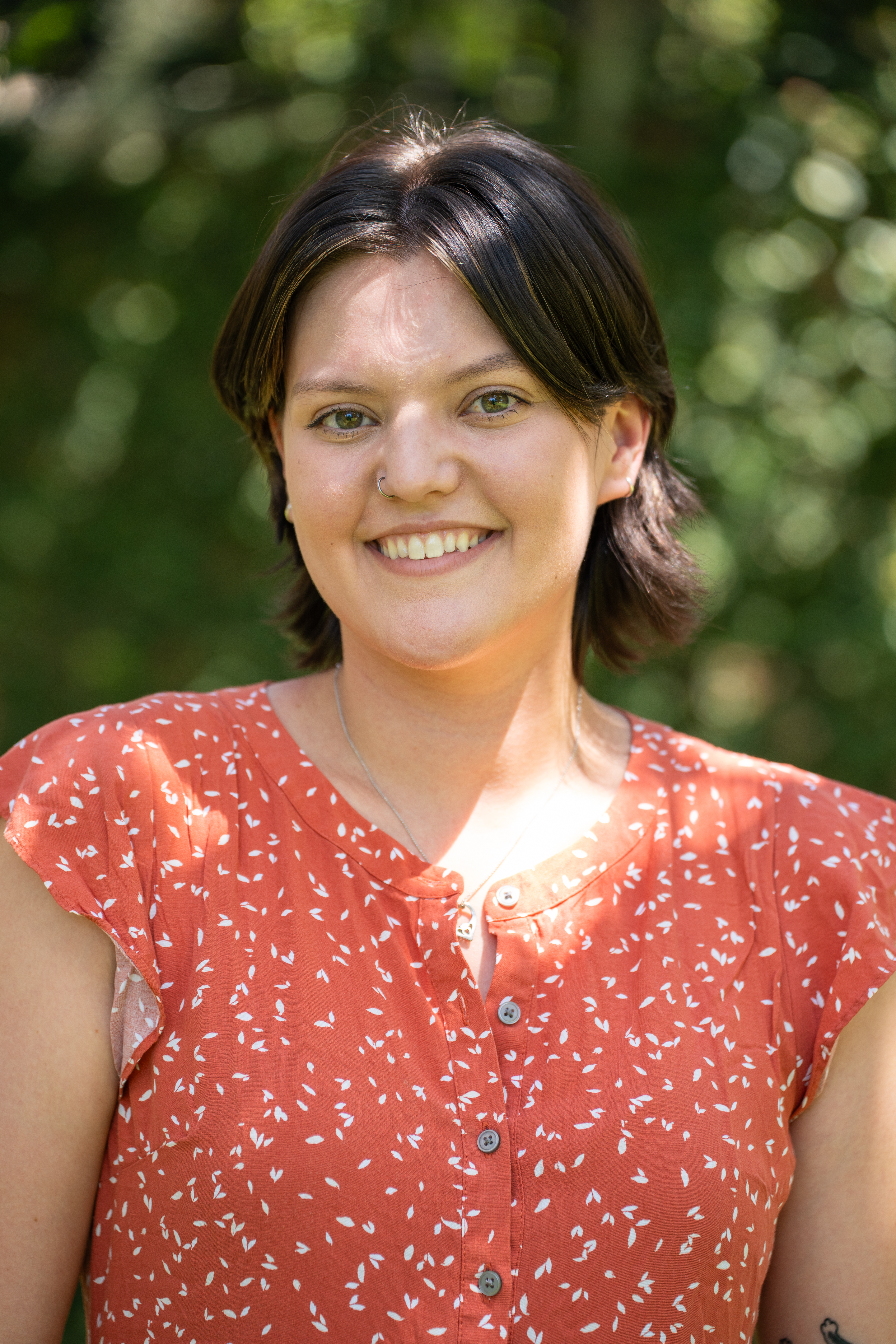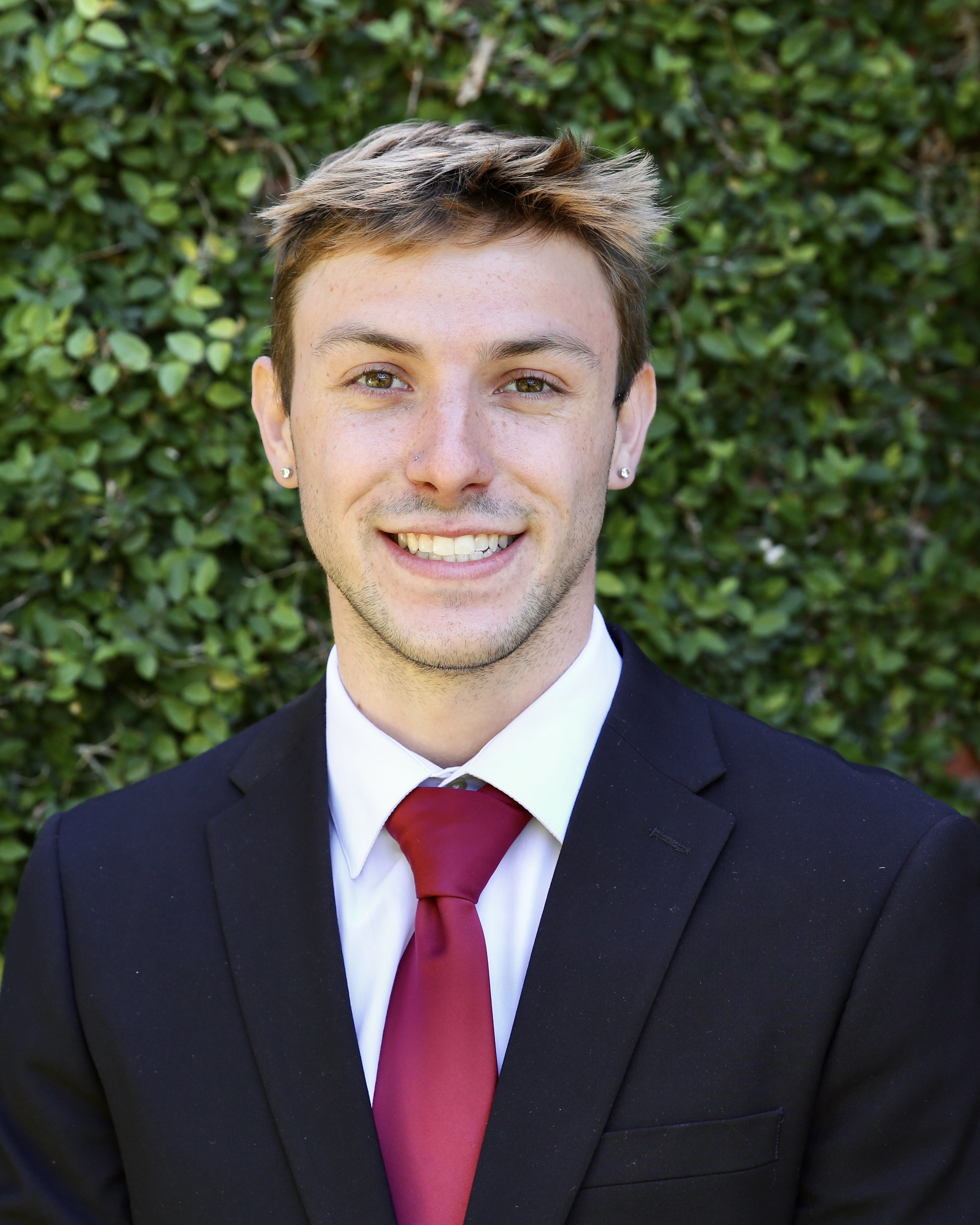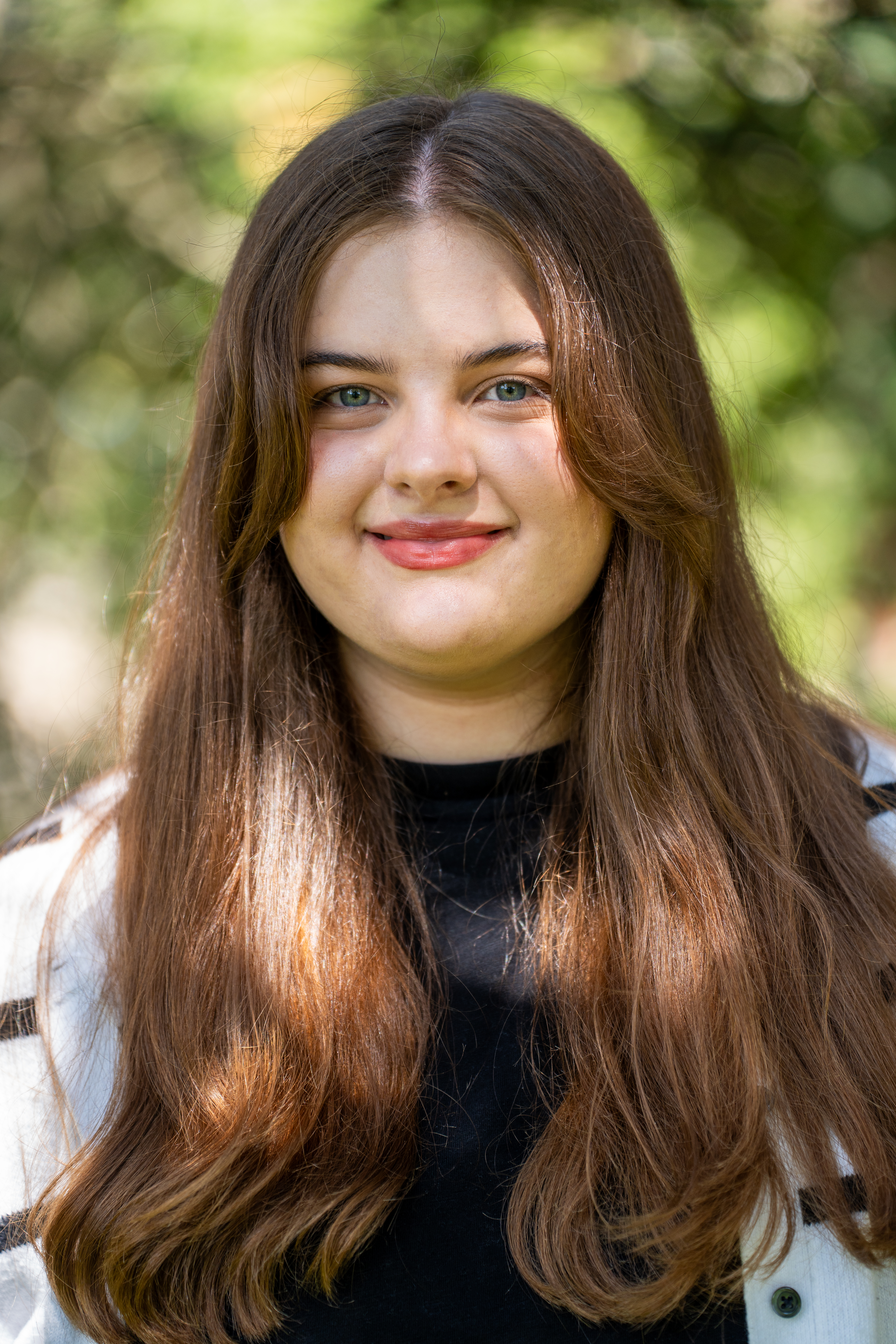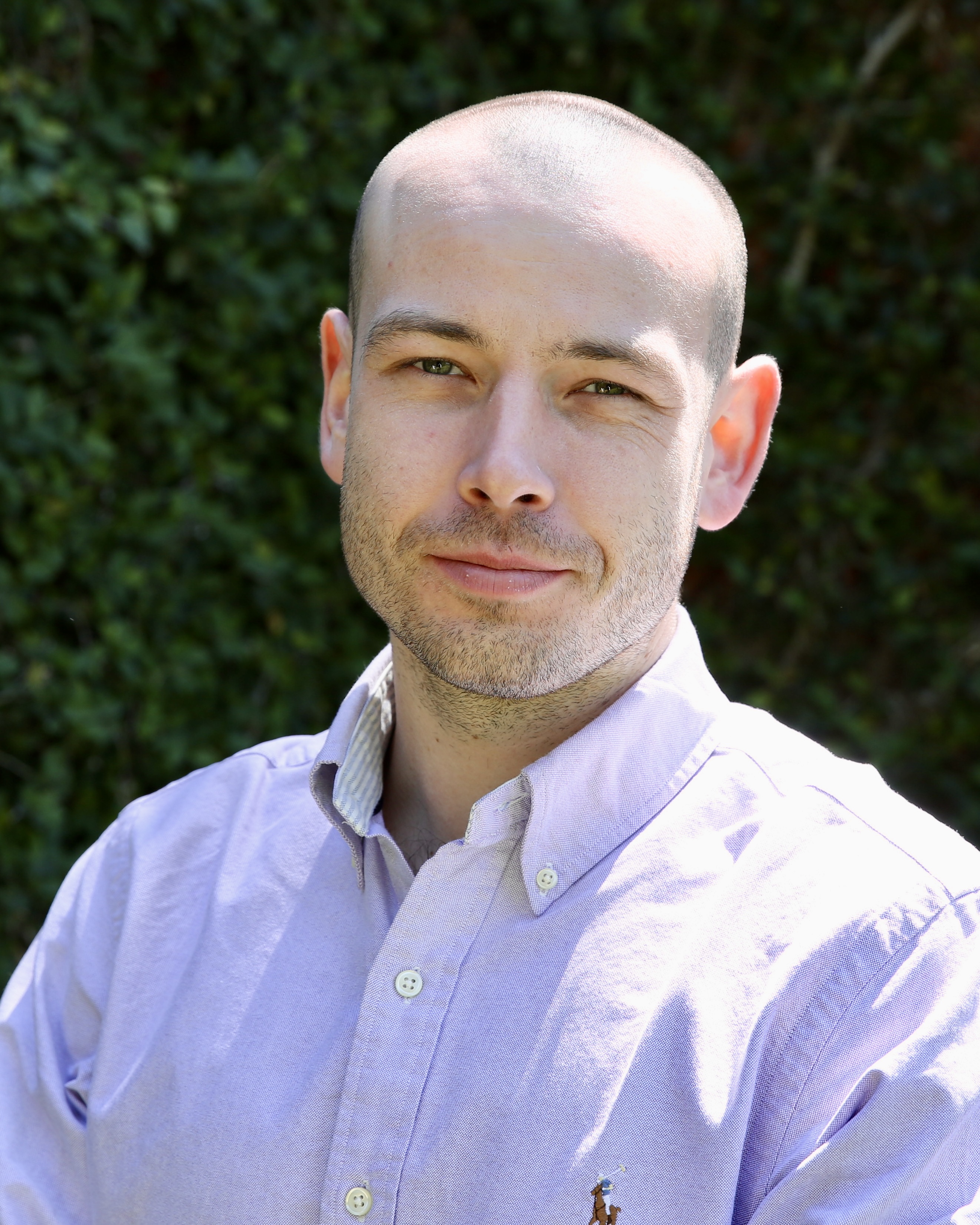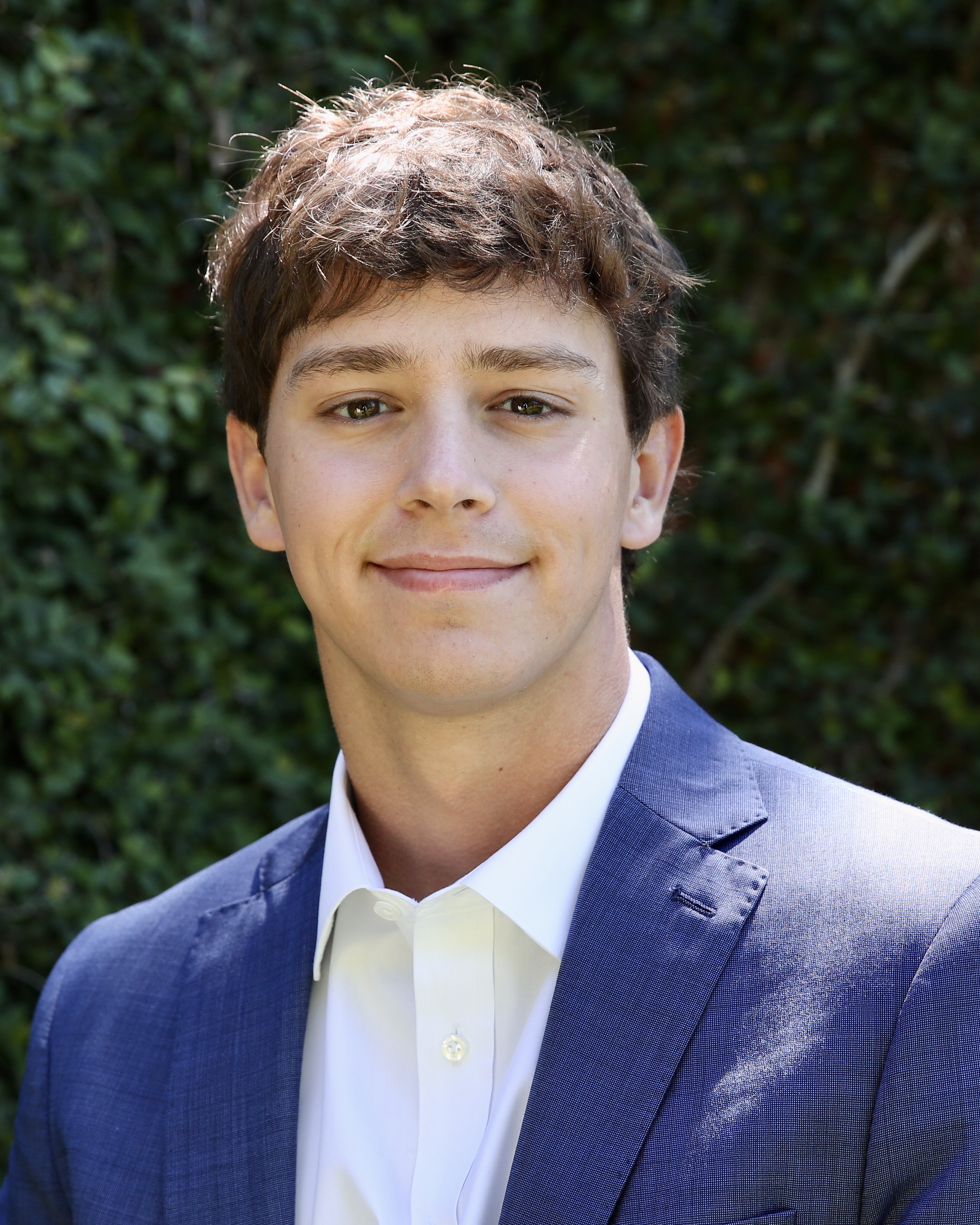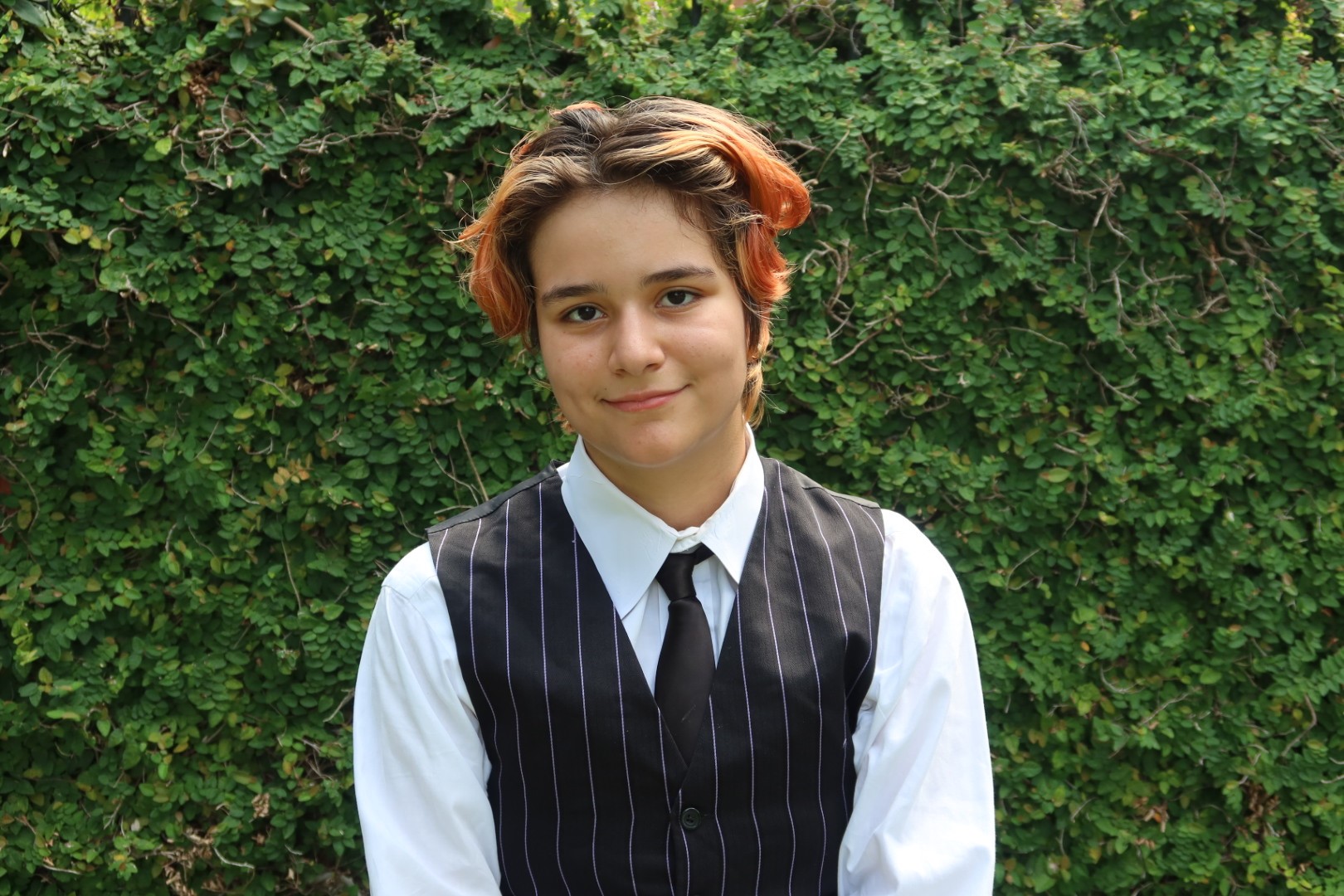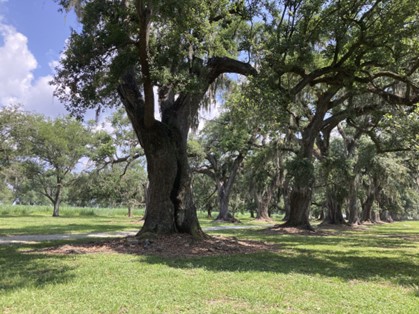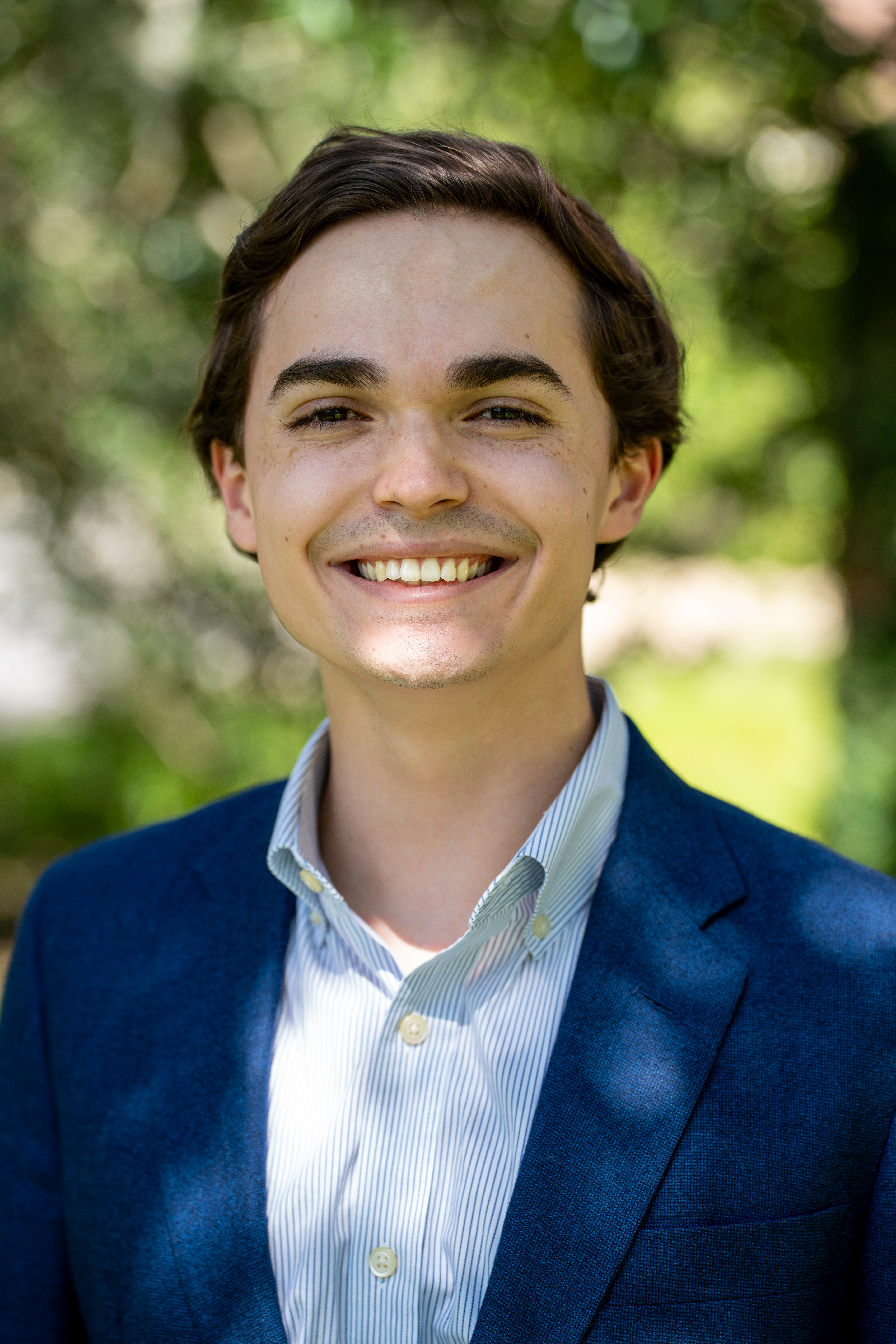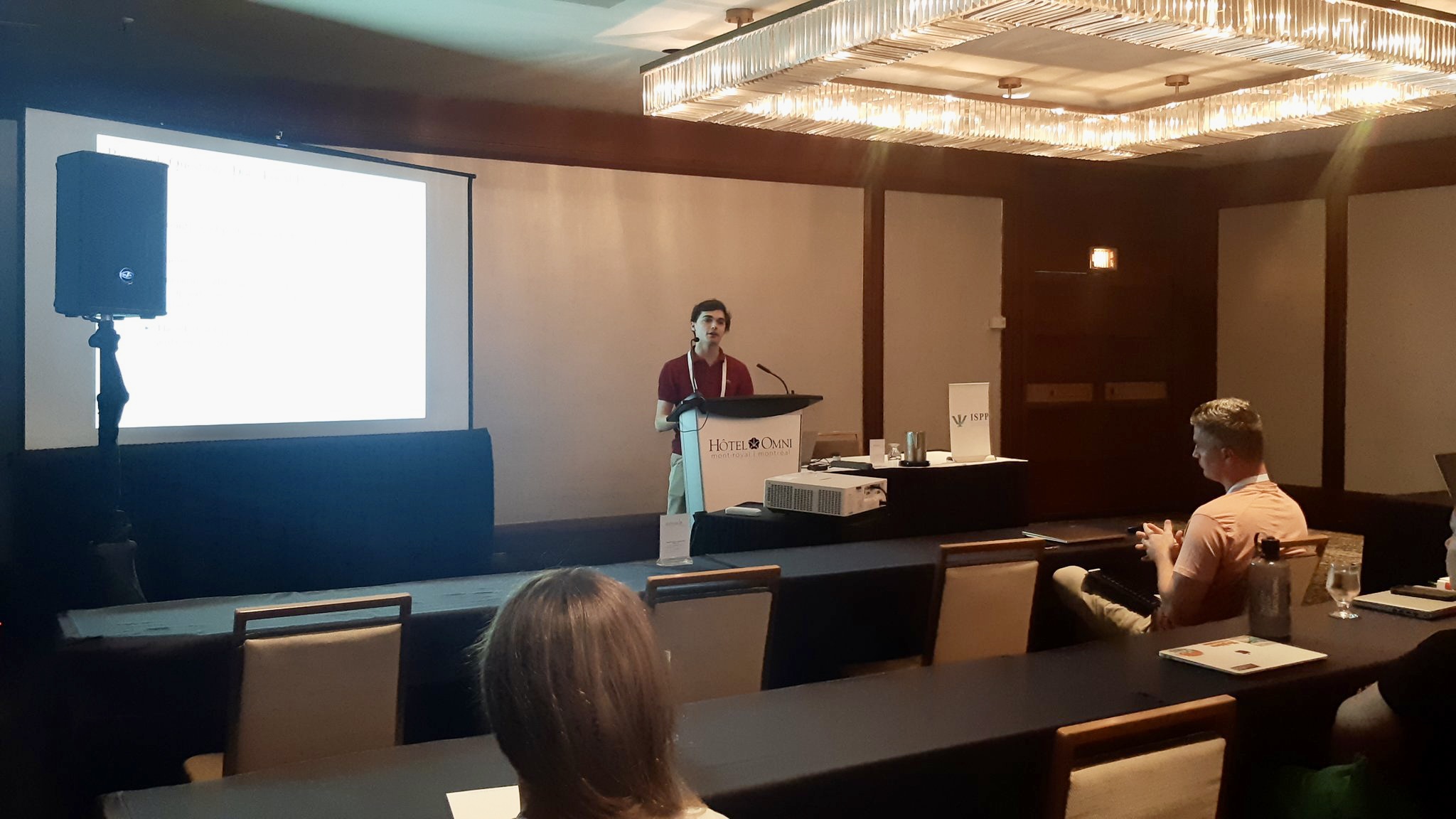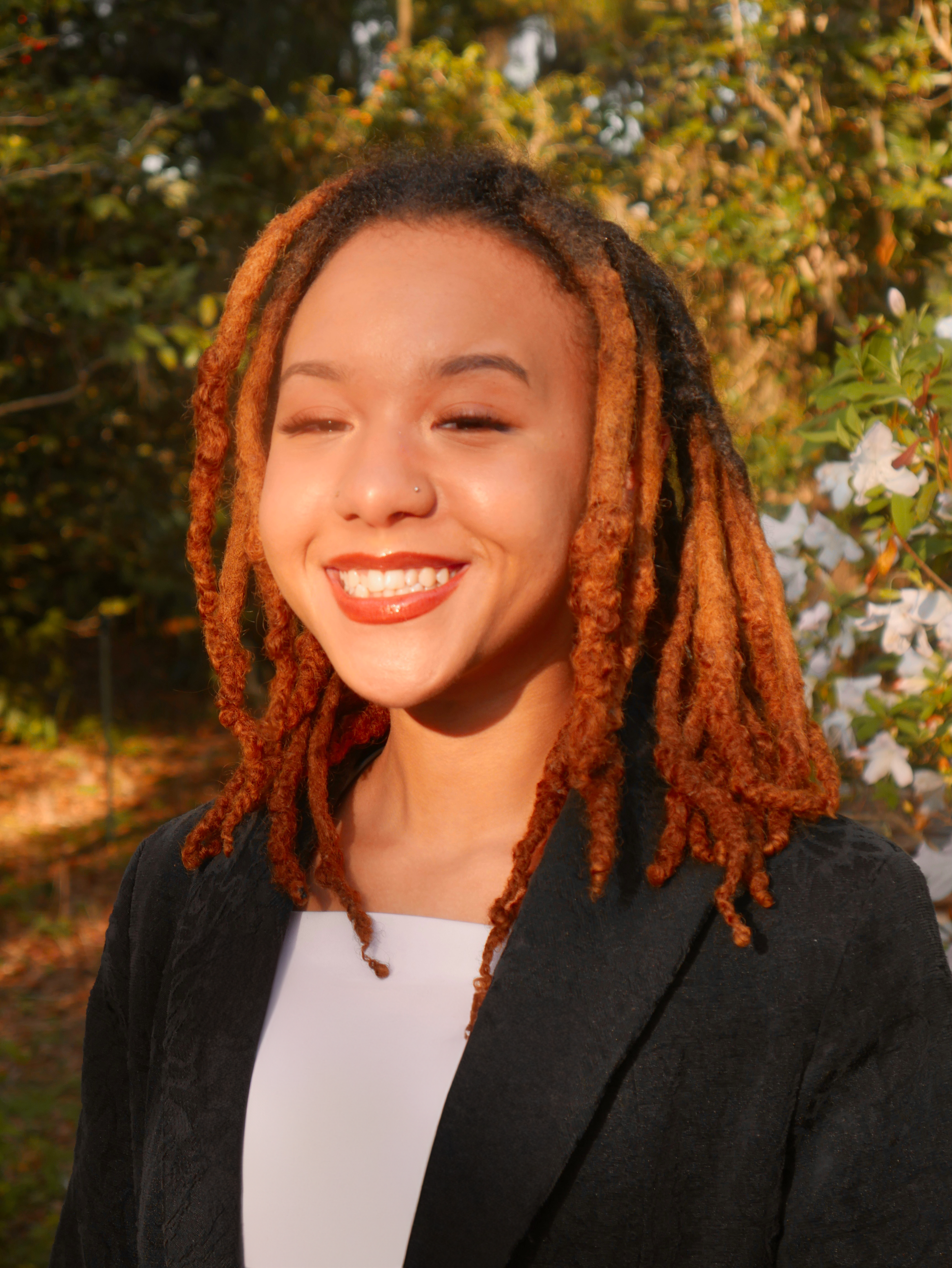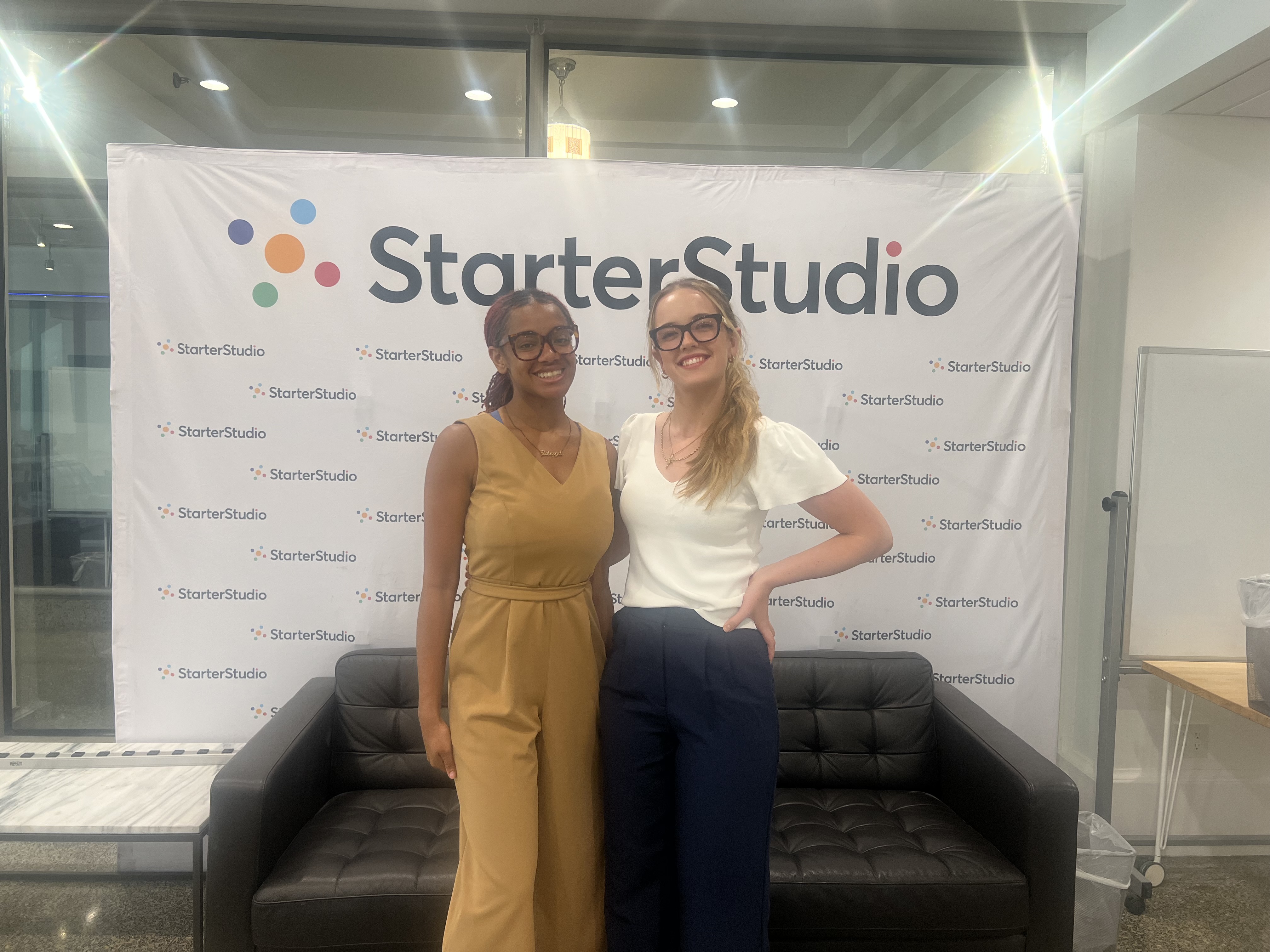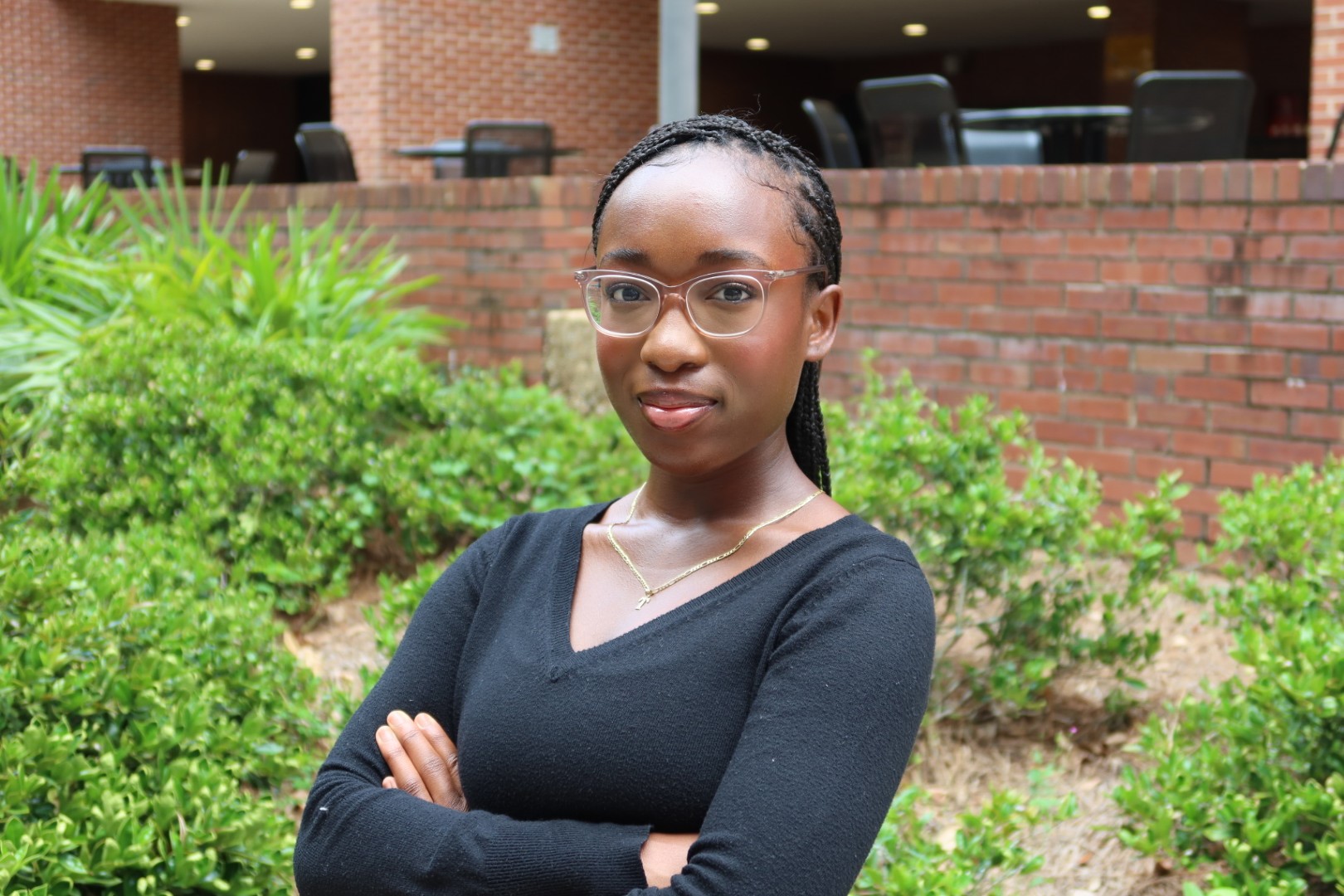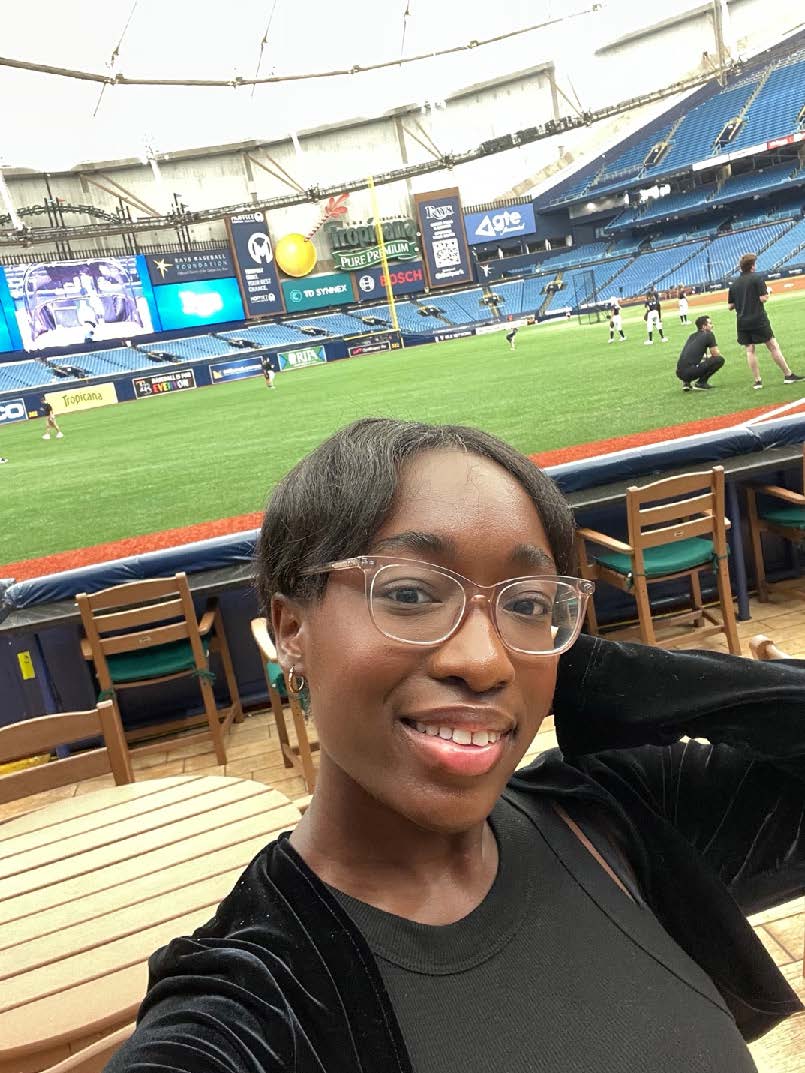President's Showcase
Rheanne Walton
Poster Presentation, Ballroom D
Supervising Professor: Dr. Chari Arespacochaga
Rheanne Walton, originally from Lawrence, Kansas, will complete her dual degree in Theatre and Marketing this May, 2024. Throughout her life she has been writing music and plays and this project is her second one-act musical. Rheanne was inspired by The Picture of Dorian Gray by Oscar Wilde, which she read in high school and which captured her imagination ever since. After graduation, Rheanne plans to get involved in corporate events and continue developing her musical, hopefully culminating in a world premiere.
Abstract
My project is a rock musical adaptation of Oscar Wilde’s novel The Picture of Dorian Gray centered on a modern queer high school storyline. I began my writing process researching the work of Stephen Sondheim, a prolific musical theatre composer. His book Finishing the Hat holds three tenets of musical theatre lyric writing: Content Dictates Form, Less is More, and God is in the Details which I strove to accomplish in my writing. Additionally, I researched popular musical adaptations that achieved what I was looking for including Shiek and Sater’s Spring Awakening, Dave Malloy’s Natasha, Pierre, and the Great Comet of 1812, and Andrew Lloyd Webber and Tim Rice’s Jesus Christ Superstar. This summer, my goal was to complete an entire first draft of the piece by working on 2 songs or scenes per week. I made many discoveries this summer, and even changed the setting from college to high school. Throughout this process, I also latched onto what I most connected with about The Picture of Dorian Gray: side character Basil Hayworth’s queer longing for the beautiful Dorian Gray. I freed myself from a complete echo of the novel and centered on Basil. As of now, I continue to edit this draft in preparation for a reading this fall and another this spring before the completion of my Honors in the Major project.
Presentation Materials
Project Materials
Project Documents and Links
Andrew Lodge
Supervising Professor: Dr. Thomas Joiner
Andrew is a fourth-year student pursuing a dual degree in Psychology and Statistics with minors in Mathematics and General Business. While at FSU, Andrew has been involved with research as a clinical psychology undergraduate research assistant, Undergraduate Research Opportunity Program (UROP) student, and UROP Leader. Andrew is also passionate about his involvement in University Housing as a Lead Desk Assistant and former Resident Assistant. When he’s not in class, Andrew enjoys thrifting, reading, or checking out the newest coffee shop in town. Andrew has a passion for research, and he hopes to continue his research by pursuing a Ph.D. in clinical psychology after graduating this fall.
Abstract
Virtues are pillars of our society, establishing the rules and norms that we live by while also shaping human behavior. Suicidality, defined as tendencies toward and engagement in various suicidal thoughts and behaviors, continues to be an area of clinical interest and continued concern as deaths by suicide remain high and suicide-related suffering continues to be a burden on individuals. While prior research suggests that virtue may be useful in the treatment of mental illness, the empirical measurement and investigation of virtue as a construct is severely lacking. My research aims to establish a set of objective virtues and test the relationships between these virtues and suicidal outcomes through a cross-sectional survey study. Linear regression and correlation analysis will be utilized to evaluate these data and the extent of the relationship between virtue and suicidality. I aim to utilize this research to aid the development of novel clinical techniques centered around virtue-alignment to ultimately improve current treatment of suicide-related conditions and behaviors, as well as psychopathology broadly.
Presentation Materials
Project Materials
Project Documents and Links
Hannah Raisner
Supervising Professor: Dr. Elizabeth Coggeshall
Hannah Raisner is a junior studying Political Science and Creative Writing. She first became interested in research through FSU’s Undergraduate Research Opportunity Program (UROP), where she worked on the site Dante Today, which introduced her to Dante and his works. After Hannah's UROP project she took two of Dr. Coggeshall’s classes about the Divine Comedy, and became interested in how the Divine Comedy and Dante are interpreted in political circles, which inspired her to pursue the IDEA Grant.
Abstract
The poet Dante Alighieri and his works have long been referenced and utilized in politics worldwide, by both left-wing and right-wing parties in various countries. While scholars have long examined the origin and impact of such references, the work is often focused on a few specific references or one particular party’s use of the poet’s work. This project attempts to make a wider, comparative analysis of references to Dante’s work in politics by surveying political references to the poet in the United States, United Kingdom, and Italy, each of which have been chosen for their famously polarizing political climates and drastic geographic, cultural, and language differences. In this paper, these references will be compared and contrasted in an effort to understand how each nation understands the poet’s work in the context of politics and uses the literature to justify its own policies and practices or condemn those of another party. In studying how these nations use Dante’s works more can be understood about the cultural significance of Dante–– does changing continents and crossing oceans affect how the poet’s work is used? Is it translation into a new language that affects how frequently and in what way the work is used? Is it a deep understanding of the poet and his work in the nation’s culture that changes how references are made? This project attempts to address all of these questions and begin to form an understanding of how the poet’s work moves around the globe in various political climates.
Presentation Materials
Project Materials
Project Documents and Links
William Pekins
Supervising Professor: Prof. Kevin Curry
Will Pekins is a multidisciplinary artist and senior Bachelor of Fine Arts candidate. Through print making, painting, and sculpture, Will’s work explores the chaotic and fractured nature of his coming-of-age experience as a young graffiti writer. After graduating in the spring, he plans on moving back to New York City to continue his career as a Scenic Artist. This location will provide the ideal community for him to pursue his professional career while also continuing to develop his personal artwork as well.
Abstract
Graffiti can be seen everywhere throughout modern society. While most of us have encountered it in our day to day lives, few people find themselves interacting with the actual graffiti artists themselves. Through first-hand interactions and interviews with New York graffiti artists, this project explores the behind-the-scenes aspects of the art form to create a dialogue that analyzes the hidden social structure within. Through examination of their livelihoods and the motivational factors that drive these artists, my work provides a commentary on the contemporary condition of this often vilified art scene. The location of New York City bears much significance for this project as it is both the birthplace of graffiti and the epicenter of the art form to this day. By synthesizing my research into the form of an artist book, I aim to shed light on an under-studied artistic culture so as to further the dialogue with those on the “outside”.
Presentation Materials
Project Materials
Project Documents and Links
Eli Butters
Supervising Professor: Dr. Adrian Barbu
Eli Butters is a junior majoring in Statistics and Computer Science and a member of the Florida State Varsity Swim & Dive team. His project involves discovering the best types of machine learning algorithms for different time series and classification problems. He was inspired to learn more about machine learning from recent breakthroughs in deep learning and their application in financial markets. Within his major, he has had the opportunity to learn more about how computers operate which has given him the knowledge to experiment with large deep learning models.
Abstract
Machine learning can be applied in a variety of different ways within financial markets in order to capitalize on inefficiencies. This research explores 3 different models designed to learn the patterns of time series data and predict their movement in the coming time periods. These models have proved effective on basic datasets but fell short when given complex and noisy market data. Instead, problems are situated to form a binary classification issue rather than a regression problem. This solves the problem of the model fitting onto useless market noise. In order to do this, a pairs trading strategy originally published by Stanford researcher Jiayu Wu, is adapted. The original strategy uses an SVM to classify time periods as either converging or diverging using price as well as other technical indicators. During the development of the strategy many architectures and types of neural networks are tested in order to achieve more accurate results. This strategy allows for more accurate capitalization on these statistical arbitrage opportunities in the markets.
Presentation Materials
Project Materials
Project Documents and Links
Justin Nightshade
Supervising Professor: Dr. Jayur Mehta
Justin Nightshade was born in and grew up in the small town of Bonita Springs, Florida. Though he came to FSU as a Creative Writing student, he discovered an interest in archaeology his first year. The reason he chose this project was because it was based in a part of Louisiana that his family is from, making it something near and dear to his heart. Justin is hoping to continue his studies in archaeology and use what he learned to make a real impact in present-day communities.
Abstract
The project that the researcher was working on over the summer was a part of an archaeological program in Louisiana. Through the Institute of Field Research, the researcher spent five weeks working at Evergreen Plantation, assisting in excavating test sites and analyzing the artifacts that were found. The purpose of the project was to, essentially, take the artifacts that were found on the site and hypothesize how they might have been used by the people who used to live in the cabins. Through the experience, the researcher was able to connect with the local population near Evergreen Plantation and see the impact that their work had on the current-day descendants of those who used to live in the cabins.
Presentation Materials
Project Documents and Links
Eli Mckown-Dawson
Supervising Professor: Dr. Lonna Atkeson
Eli McKown-Dawson is a senior majoring in Political Science with minors in Statistics and Philosophy. He discovered his passion for public opinion research in the Political Science Department’s Research Intensive Bachelor’s Certificate Program. Since then, he has worked with Dr. Lonna Atkeson to study elections, American voting behavior, and survey methodology. Eli is also an Undergraduate Research Fellow with the LeRoy Collins Institute, a Research Intern with the DeVoe L. Moore Center, a contributor at YouGov, and a Policy Director in FSU’s Student Government Association. His research assessing Americans’ confidence in election outcomes and beliefs about the secrecy of their ballot has been published by YouGov, the Election Law Journal, and the MIT Election Data & Science Lab.
Abstract
America’s political environment has become increasingly nationalized and affectively polarized. Both findings support the implication that local political context has become less important, with relatively homogenous groups of Democrats and Republicans behaving similarly across the country. I challenge this assumption and show that local political conditions moderate the association between party identification, voting behavior, and policy positions. I hypothesize that location influences these behaviors and attitudes through place-based differences in the partisan makeup of Americans’ social networks. Living and interacting with those who support a particular political party should nudge Americans to support candidates and issues supported by that party. I utilize Cooperative Election Study data from 2006 to 2022 to assess whether the partisan makeup of respondents’ counties, measured as the average difference between county-level Democratic and Republican vote share in the previous three presidential elections, is associated with behavioral or attitudinal differences among co-partisans. I find significant differences in Americans’ political behavior and policy preferences based on local party support in their counties. Holding individual-level party identification constant, Americans in Democratic counties are more likely to support Democratic policy positions, and Americans in Republican counties are more likely to support Republican policy positions. These effects are strongest among independents and “weak” partisans, while “strong” and “leaning” partisans are less likely to be impacted by place. My findings shed light on how communities and social networks influence political behavior and have implications for the accuracy of public opinion surveys.
Presentation Materials

